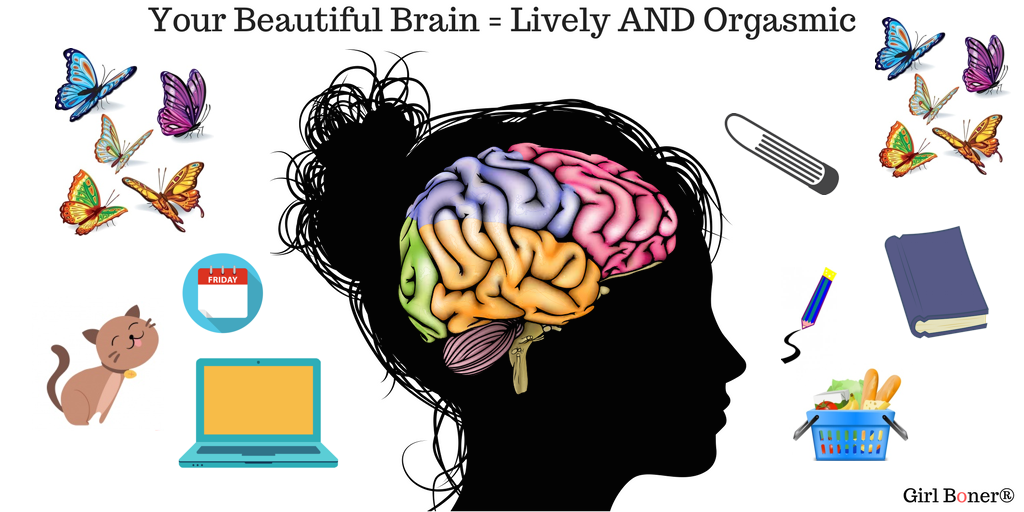According to a new study, no. And that’s an awesome thing!
Last week I interviewed one of the fabulous researchers behind the study, Nan Wise, PhD, on Girl Boner Radio. I loved what the sex therapist, cognitive neuroscientist and certified relationship specialist had to say—not only about orgasm and the brain, but the importance of cultivating pleasure in our lives.
Here are a just few of my favorite takeaways. Stream the full episode below or most anywhere you listen to podcasts!
No, women’s brains need not “switch off” in order to experience orgasms.
For Wise and her team’s research, published in The Journal of Sexual Medicine, ten women experienced self- and partner- stimulated orgasms in an MRI machine—much like the study I participated in solo a few years back.
Contrary to other research conducted in Holland which showed a drop in frontal brain region activity, particularly for women, this study — which was very well statistically and experimentally controlled— confirmed that the brain does not “switch off” in some way. Brain activity in numerous areas, including sensory, motor, reward, frontal cortical and brainstem regions, increased leading up to orgasm, peaked with climax, then lowered back down.
Wise wasn’t surprised by the findings, especially given her team’s previous research.
“I was expecting to see that there were likely a bunch of brain regions involved in something that is such a big event,” she said. “Orgasms, literally, they just feel very big.”
A takeaway for us all? We can have plenty of thoughts whirling through our minds and still experience plentiful pleasure and orgasm. Or as Wise put it, “You don’t have to have a completely quiet mind to be sexual.”
Taking the pressure to orgasm off could be the best way to invite one.
In our performance-driven culture—and because, hey, orgasms are awesome!—it can be easy to fixate on climax as the ultimate sex goal. But focusing on getting there can work against us.
“The minute you feel pressured like you have to have an orgasm, it becomes increasingly difficult when you’re goal oriented,” Wise said.
This is why she really encouraged study participants to relax into the sensation. And guess what? Those who weren’t necessarily striving for orgasms seemed the most efficient at experiencing them.
Pleasure matters. Big time.
No, not merely in a sexual science research lab or even solely in the bedroom. This idea, particularly in the context of our “pleasure-lacking culture,” drives Wise’s work.
“It’s important that we understand the basic wiring of the sexual brain and also make sexuality and pleasure important, because it really, really is,” she said. “Pleasure’s not selfish. Pleasure’s not optional. Pleasure’s a big part of when we’re in an emotional balance—not just sexual pleasure but pleasure period.”
To hear some of her top tips for bringing more pleasure into your life, Dr. Megan’s thoughts for a listener managing chronic fatigue syndrome through vibrator masturbation and much more, stream the episode on iTunes, iHeartRadio, Stitcher Radio, GooglePlay or right here. I hope you enjoy our chats half as much as I did!
Did these findings surprise you? What struck you most about the episode? If you have a question you’d like explored in an upcoming episode, drop me a private note here.

August, please don’t ever change your basic format here. I don’t always (make that “seldom”) find the time to listen to all, or even most, of the audio. Sometimes, I let it run while I do other things. However, I, generally, find time to read your synopsis. Those intrigue me a great deal. I always enjoy them. Don’t stop writing them.
Scott
PS- glad to know I don’t have to shut down to have orgasms. But, like the study, I notice that when I want to hit it, it often slips away.
Thanks, Scott! I really appreciate the feedback and am so glad you find the overviews and such helpful. I figure some people prefer reading, others prefer listening and some prefer both.
Hi,
I listened to you today – first time actually – and I’m glad there’s such a voice like yours on the internet. One thing that struck me in today’s interview was what was said about women’s power. That your power doesn’t take anything away from men. But I hope it does! I mean, female empowerment takes away male supremacy. Right, it does not take away male power, because in the equal meeting man/woman both can exercise their power for play and pleasure. And that power, isn’t it even augmented in the interplay with another’s power for pleasure?
These thoughts wouldn’t have come to my mind without my listening to today’s powerful interview – so thanks!
Ellington
(Arletta is not here today, so it’s just me writing this, but I’ll ask her what she thinks about this too)